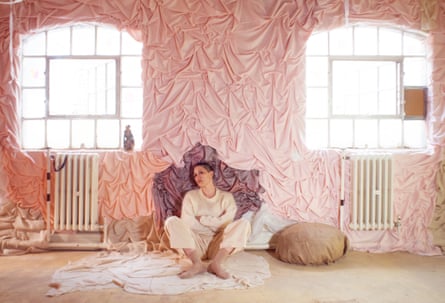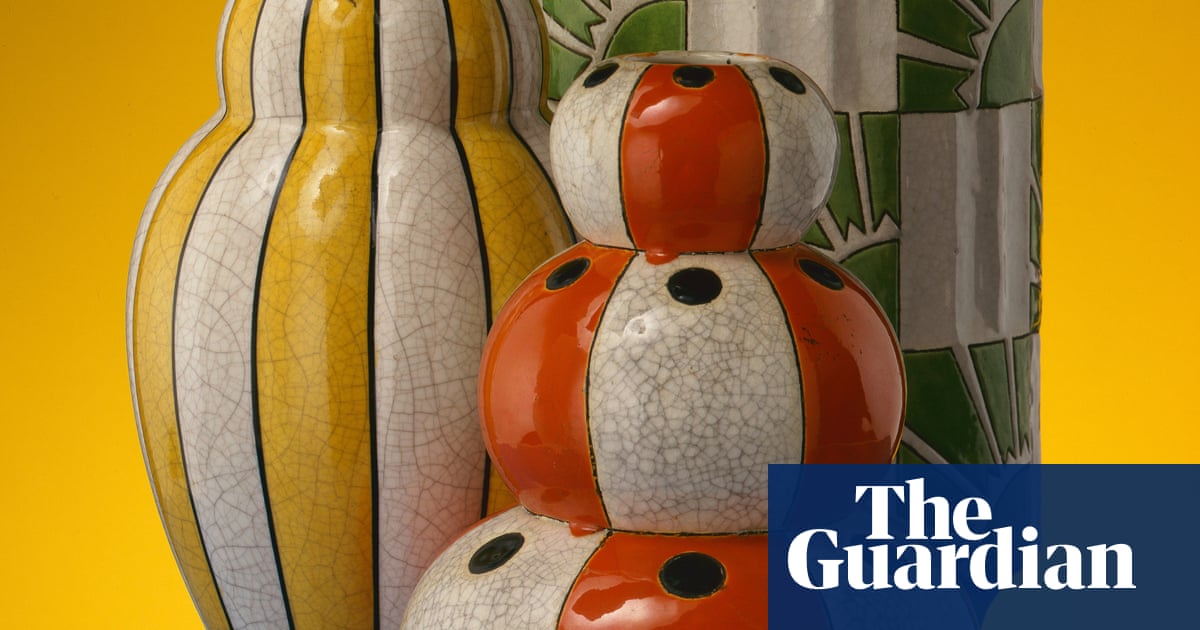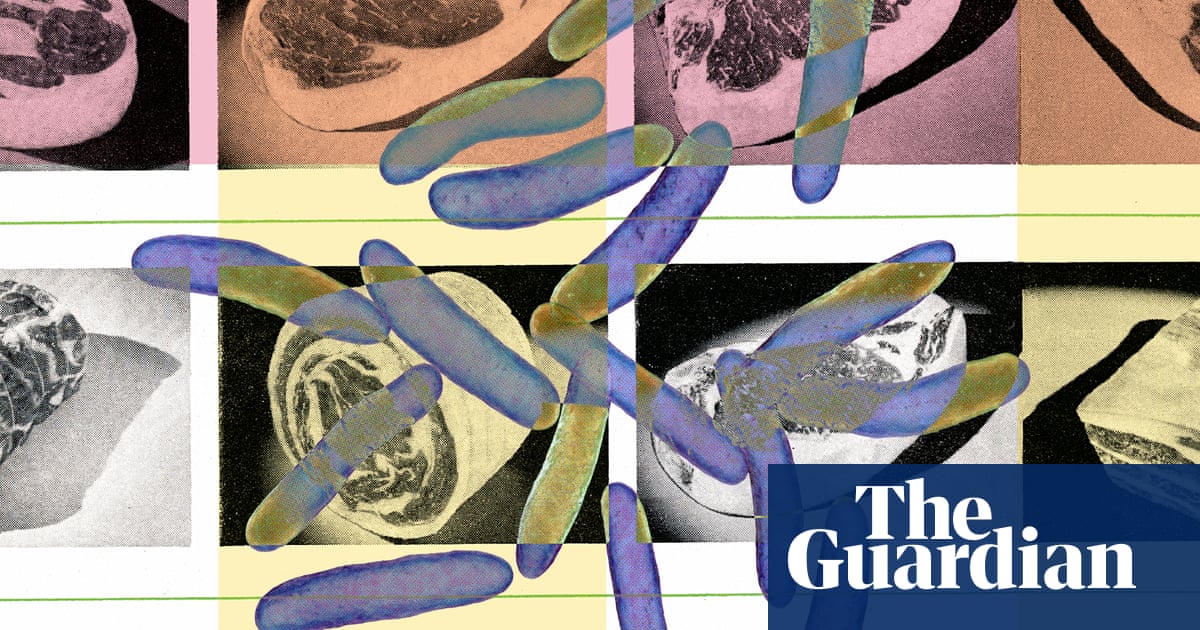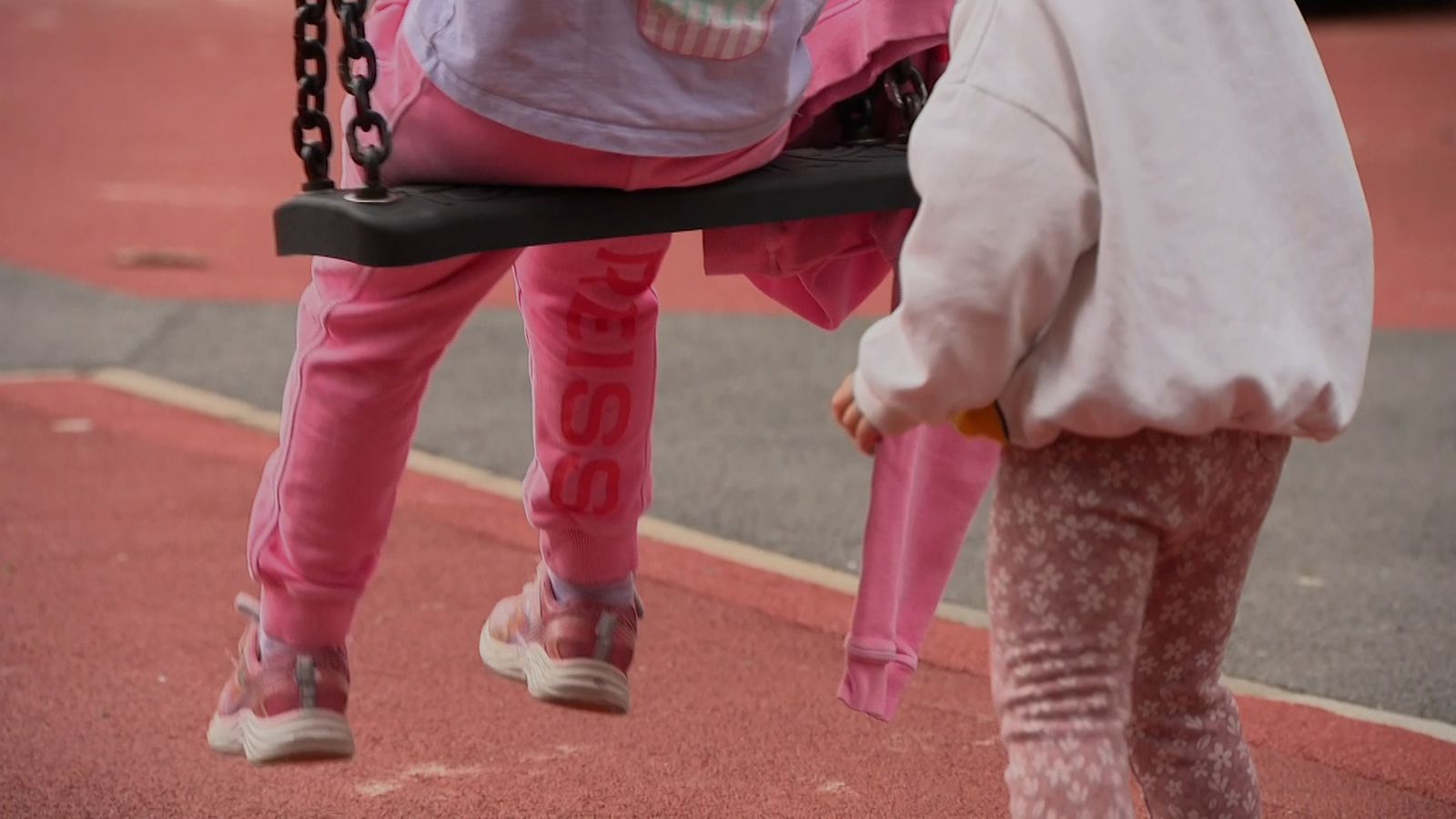Cate Le Bon has shaved her head. She had been wanting to do it for ages. “Just feels nice to get rid of this hair you’ve had on your head for a long time,” she says, cutting into a mushroom pie outside a south London pub in early May. “Feels quite restorative. Feels functional, which I like.”
Her blue sweater vest exposes her bare arms, the left tattooed with a tiny “T” wearing a crown, to the stealthy midday heat. A woman shaving her head can carry a lot of cultural baggage, but can also get rid of it. Typically pragmatic, ever in her own lane, the Welsh musician and producer hasn’t really noticed a reaction either way. “I’ve really just been in the bubble of friends and family for the past year, not really been out and about too much, which has been really nice.”
Born in Carmarthenshire, Le Bon, 42, has been living back in Cardiff after spending much of the past decade in California. Her desolately beautiful seventh solo album, Michelangelo Dying, was supposed to come out last year. Instead, exhaustion and persistent illness after the dissolution of a long relationship, and her desert dream with it, meant everything had to stop.
Le Bon can appear regal live, manipulating her guitar with Tilda Swinton-level poise, but in person she’s softly spoken, gentle and succinct. She would rather avoid specifics about the end of the relationship: “It’s not really about him,” she says, of Michelangelo Dying. Instead, the album is about grieving a fantasy and “realising you’ve completely abandoned yourself in the throes of this all-encompassing love. The breakup was always like an amputation that you don’t really want, but you know will save you.” Her lyrics outline a world falling apart and not being able to do anything about it, even being told the world is different from reality as trust wastes away to nothing: “You smoke our love like you’ve never known violence,” she sings with crushed condemnation on Heaven Is No Feeling.
In an unparalleled catalogue of uncanny, soft-worn post-punk that’s entirely Le Bon’s own – one that started in 2008 and hit its stride with 2016’s absurdist Crab Day – the album is another cut above: emotionally direct in a new way for her, but submerged in a crystalline murk, like light refracted through shadowy water (the artwork depicts her drowning). She recorded it between Los Angeles, Cardiff, Hydra and, finally, the Joshua Tree desert that had been her home and creative wellspring, to give the album its spiritual conclusion. “There’s something about that space where I feel I’m all ages at once,” she says. “I feel it when I’m in the sea, when I’m in love, when I’m with people who ignite me.”
Guitar refrains repeat throughout the record as she puzzles out the “impenetrable. That’s how I felt – like I tried everything.” Her melodies give these songs their shape: “She’s got this vocal phrasing that’s awkward in the best way,” says collaborator John Cale, who appears on the song Ride. “The voice is beautiful but her delivery is what opens her up to everything.”

At home in Cardiff the post-punk iconoclast is just Cate Timothy (Le Bon was a joke from an early gig poster that stuck). She starts her day by making coffee and listening to drone music: “almost like medication” – Ellen Arkbro, Kali Malone, Éliane Radigue, the latter recommended by Bradford Cox of Deerhunter, whose last record Le Bon produced. “It creates this porous landscape that reacts to however you’re feeling in the moment,” she says. She’s also been making drone music with friends “for nothing other than the joy of it, the healing nature of it, and having time to do stuff like that that isn’t for something.”
Her best friend since the age of 11 lives close, as does her younger sister with her new baby, as well as her cousin and her parents. Le Bon gardens, cooks and walks her new rescue dog, the scruffy terrier Mila, who has springy eyebrows and a great sense of humour. “There was always this proverbial dog I was going to get at some point, which I suppose represented a lot of things,” she says. “I saw her on the West Wales Poundies [Dog Rescue] site and went: Oh, I think that’s my dog.” She can’t show me a picture of Mila fast enough: she looks like a Shirley Hughes illustration. “I think making space for her in my life, and prioritising her, as ridiculous as that sounds, has been really wonderful.”
Caring for Mila and having a routine that lasted more than a few months between tours reminded Le Bon to care for herself. She had been trying to outrun heartbreak, busying herself producing for other artists: Devendra Banhart, Wilco, Horsegirl; she’s in Peckham this week with Dry Cleaning before they record their third album in France.
Even though she only works with acts she feels a connection with, she says, “I was very willing to go anywhere, any time, to work on stuff I loved. I didn’t really have a home. I became very exhausted from it.” She had been experiencing full-body hives, debilitating back issues and strange anxiety. Her symptoms eventually made her realise she had felt “a reluctance to see things as they are”, she says in her calm, considered way, “because you think love is enough, and I think that’s the most heartbreaking thing, when you realise that love isn’t enough.”
Originally, Le Bon set out to make a very different kind of record: a spikier, sharper follow-up to the warped beauty of 2022’s Pompeii. The breakup was “a very messy end, a decision that was made and not made at the same time”, she says. “It was discombobulating. I kept thinking I would come back to myself by making a record, but I was trying to make a record that had nothing to do with it.” Eventually, she had no choice but to get over her resistance to writing about love. “There’s a softness that comes from the surrender,” she says of the album’s almost dubby, decaying sound. “A fluidity, a kind of honesty in throwing yourself into something because you know you have to, instead of bracing yourself against it.”
She describes the album as “photographing a wound but picking at it at the same time”. The contradiction of heartbreak is the desire to escape it while also refusing to let it go: “Heartache railing against its own impermanence”, as Le Bon puts it, beautifully. “When you’re in it, you feel like it will never end. And there is a comfort in that, because it keeps you attached to something that really meant, or means, something to you. Sometimes you don’t want it to end because it will keep you in those loops. Once you get out of them, that’s when it ends.”
Historically a magnetically ambiguous lyricist, Le Bon wrote more directly than ever “because I was trying to communicate with myself”. She aimed to confront “the violence of seeing things as they actually are”. It’s hard, she says, when love is “mixed invention: the fractured nature of memory, memories of the future and what you hope something is.” On Is It Worth It (Happy Birthday)? she sings: “Dig deep, are you dumb or devout?” It’s the fine line between having faith in someone and duping yourself. “That sunk cost,” she says. “You continue to hope that something will change.” She thought she was singing to or about her former partner, but realised: “I am all the characters at once.” On About Time, she sings: “I’m not lying in a bed you made.” She says now: “It’s the bed I’ve made really, isn’t it?”
after newsletter promotion

The song Body As a River dwells on the sickness that had been creeping up on her: “I read what I write and it’s never without shame,” she sings. When women make decisions for themselves, says Le Bon, “it’s often coupled with a shame of sorts, a feeling of your responsibility for other people’s feelings or emotions: that you’re unable to carry everything for someone because you love them so much.” She keeps returning to a quote by author Alice Munro: “When a man goes out of the room, he leaves everything in it behind … When a woman goes out she carries everything that happened in the room along with her.” Michelangelo Dying, says Le Bon, contains no profound revelations. “It’s about putting things down so you can unencumber yourself and move on. Making decisions that are much more aligned with reality.”
The album’s imagery was inspired by another room, Tunisian-American artist Colette Lumiere’s installation Recently Discovered Ruins of a Dream, depicting a woman alone in a chamber lavishly draped with fabric, with mirrors. “That’s what I really wanted the record to feel like,” says Le Bon. “You can roll up your sleeves and take something on, then you have a rest, because something is resolved.” Trying to run past heartache, she says, meant “forgetting the best part, where you reap the rewards of your work; that period of absorbing what has just happened”.
We talk again a few weeks later, when Le Bon is with Dry Cleaning near the Loire valley. It’s her day off. Later, she’s going to swim in a lake and go to the supermarket for continental treats. They have consumed much bread and wine. “I’m really enjoying being here and being really present,” she says. “The band just keep revealing themselves to be more and more lovely.”
Relationships such as this have become paramount. “I’ve learned something about decentralising the importance of romantic love,” she says. “In this past year I’ve seen that Delmi” – the friend she met when she was 11 years old – “is one of the great loves of my life. Seeing things as they are, you can welcome things in that complement you better. That forest fire of romantic love makes you abandon a lot of things.”
The past few years have also recalibrated Le Bon’s relationship with music. Before making 2019’s Reward, she took a year off to study carpentry, just to make sure she was making music out of heart, not habit. Her recent break taught her that sometimes “you have to stop something you really love because you love it too much. You have to really take care of your relationship with something like music when you love it but it’s also your job. It’s a practice. It can’t just be a feeling that you gorge on.”
Cale tells me he admires Le Bon’s “constant evolution: you really don’t know what you’ll get but you know it’ll be sincere, honest, thoughtful.” She returns the compliment. “He’s been in one of the biggest, most influential bands, then as a solo artist he’s kept this forward motion where he’s tried to uncouple himself from that. He’s constantly shedding so he can get to the next thing. Because of that, he’s all the ages and no age at all. He’s got his head down in the purpose and intention of creating. And I find that really inspiring.”
You can imagine dozens of younger artists saying the same about Le Bon: she’s such a potent influence that a Fake Le Bon seems to pop up every other week. It’s not in her nature to have noticed: whatever identity traps or “self-referencing” social media encourages in artists now, “I try heavily to avoid that in quite a violent way,” she says. “I never think about anything I’ve just done, and then I think about what I can do next. I think it’s healthier. It lends itself to a lightness, a freedom that makes you more porous to doing things differently the next time.”
Le Bon isn’t touring Michelangelo Dying until October. “I wish we were starting tomorrow,” she says. In the meantime, her dream room of one’s own is a big garage to do all her projects in. At home, she will walk Mila, read Renata Adler, Rachel Cusk, keep going to the women’s boxing group she joined recently. She’s left the heartbreak behind. “That choice to take it on, and not just put it aside, but really heal from it and learn from it, has allowed me to shed it all.”
Michelangelo Dying is released on 26 September.

 7 hours ago
2
7 hours ago
2










 English (US)
English (US)